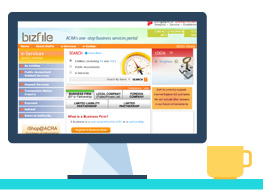What is an Annual Return?
 An Annual Return is an electronic submission made to the Accounting and Corporate Regulatory Authority (“ACRA”), which is Singapore’s national regulator of business entities and public accountants. ACRA is the statutory board that oversees the regulation of companies in Singapore and is vested with the power to impose composition fines and issue court summonses to companies that have defaulted on the ongoing compliance requirements as set out under the Companies’ Act.
An Annual Return is an electronic submission made to the Accounting and Corporate Regulatory Authority (“ACRA”), which is Singapore’s national regulator of business entities and public accountants. ACRA is the statutory board that oversees the regulation of companies in Singapore and is vested with the power to impose composition fines and issue court summonses to companies that have defaulted on the ongoing compliance requirements as set out under the Companies’ Act.
A company’s submission of its Annual Return is dependent and contingent on when it holds its Annual General Meeting (“AGM”); and it is a statutory requirement under Section 197 of the Companies’ Act to file an Annual Return within one month from the date of the company’s AGM. As the name implies, an AGM and Annual Return should be submitted by a company annually and is one of the ongoing compliance requirements that companies are obliged to comply with. The only exception to this requirement would be newly incorporated companies, which are allowed a longer period of 18 months from the date of incorporation to hold their first AGM.
Do all companies have to comply with the same filing requirements when submitting their Annual Returns?
Depending on the type of company, the filing requirements would differ accordingly. The table below provides a comprehensive overview of the different types of companies and the respective filing requirements that they would be obliged to comply with.
| Filing Requirements | Definition | Solvent (The company is able to meet its debts when they fall due) | Insolvent (The company is not able to meet its debts when they fall due) |
|---|---|---|---|
| Small EPC | EPC with annual revenue up to S$5 million or less for financial years with effect from 1 June 2004 (S$2.5 million or less for financial years between 15 May 2003 and before 1 June 2004) |
|
|
| Normal EPC | EPC with annual revenue more than S$5 million for financial years with effect from 1 June 2004 (or more than S$2.5 million for financial years with effect from 15 May 2003 but before 1 June 2004) |
|
|
| Dormant EPC | EPC that do not have any accounting transactions* (no business activities) for the financial year concerned or have not commenced business since incorporation.
* Please refer to sections 205B(3) and 199(1) of the Companies’ Act for more information. |
|
|
| Private Company (Non EPC) | A company limited by shares with at most 50 shareholders |
Active:
Dormant:*
* Please refer to sections 205B(1), (3) and 199(1) of the Companies’ Act for more information. |
|
| Public Company |
|
Active:
Dormant:*
* Please refer to sections 205B(1), (3) and 199(1) of the Companies’ Act for more information. |
How can my company submit its Annual Return?
 A company submits its Annual Return through ACRA’s electronic portal known as Bizfile. To access Bizfile, one would need to have a valid SingPass and be a director or officer of the Company.
A company submits its Annual Return through ACRA’s electronic portal known as Bizfile. To access Bizfile, one would need to have a valid SingPass and be a director or officer of the Company.
A SingPass is an electronic identity that is given to Singapore Citizens and Permanent Residents. Foreigners who hold Employment Passes, Personalised Employment Passes, EntrePass, S-Pass, Dependent Pass, Long-Term Visit Pass-Plus and selected Work Permit Holders, may also submit an application to obtain a SingPass . Upon approval, the SingPass will be sent to your local address within four working days.
In addition, payments for lodgments made via Bizfile will have to be done electronically, upon submission. Bizfile accepts the following payment methods:
- Credit card (VISA/MasterCard/American Express)
- eNETS Debit
- Deposit Service Account – for professional firms that lodge transactions on behalf of their clients.
Notwithstanding the above, given their relative unfamiliarity with using the Bizfile system, companies often choose to seek the services of professional corporate service firms such as InCorp to assist with the submission of an Annual Return.
As part of the electronic submission for the Annual Return, the company will be required to verify and submit the following information:
| Company’s full name and registration number | |
| Registered address | |
| Principal activities | |
| Company type (i.e. private company, public company, small exempt private company) | |
| Summary of issued and paid-up share capital | |
| Registered charges | |
| Information of Directors, Company Secretary, Auditors and Shareholders | |
| Financial period that the audited accounts have been made up to | |
| Accounts in full or partial XBRL format |
What if my company is unable to meet the deadline?
In the event that a company is unable to meet its deadline to hold its AGM or file the Annual Return in a timely manner, the company should apply for an extension of time under Section 175 and/or Section 201 of the Companies’ Act. Failing which, ACRA will impose penalties as pictured in the table below. Do note that an extension of time can only be applied for before the deadline has lapsed.
| Length of Default (Days) | Late Lodgement Fee |
|---|---|
| Not more than 30 days | $60 |
| Between 31 days and 60 days (both days inclusive) | $120 |
| Between 61 days to 90 days (both days inclusive) | $170 |
| Between 91 days to 180 days (both days inclusive) | $220 |
| Between 181 days to 365 days (both days inclusive) | $250 |
| Between 366 days to 730 days (both days inclusive) | $350 |
| Between 731 days to 1095 days (both days inclusive) | $350 |
| More than 1096 days | $350 |
While the penalty imposed by ACRA is subject to a maximum cap of S$350.00, companies should take note that ACRA charges this separately for each section, i.e. if a company defaults under Section 175 but complies with Section 201, it will be fined only under one section. However, in the unfortunate circumstance where a company defaults under both Section 175 and Section 201, the company will incur penalties for both defaults and the maximum penalty that the company will be liable for will be S$700.00.
Section 175 has two different requirements, namely:

- Newly incorporated companies – As described previously, Section 175 allows newly incorporated companies to hold their Annual General Meeting (AGM) within 18 months from the date of incorporation;
- Companies that have already held their first AGM – Subsequent to the first AGM, companies are required to hold their AGM once every calendar year, or 15 months from the date of the last meeting, whichever is earlier.
Section 201 notes that the audited or unaudited accounts of the company, which is required to be submitted as part of the Annual Return, should not be dated more than six months before the date of the AGM.
The lodgment fees incurred for applying for an extension of time will be typically S$50.00 per month, subject to a maximum cap of two months. Once a company has applied for an extension, it cannot apply for a further extension.
As part of the application, the company will be required to state its reason for doing so. The standard reasons that can be selected from the drop-down menu are as follows:
- Accounts are not ready
- Accounts are with the police or other regulatory agency
- Auditor needs more time
- Directors are overseas (and therefore, are unable to approve the accounts)
- Documents are destroyed (leading to the unfortunate circumstance where the accounts cannot be prepared, or there is insufficient documentation to justify the information reflected in the accounts)
- Any other reason
- The company is in the process of Striking Off
If the company chooses to select “any other reason”, it will be required to provide a short description on the circumstances that have resulted in the delay.
Why is the Annual Return important to my company?
There are several key reasons as to why meeting the ongoing regulatory compliance requirements, such as the submission of Annual Returns, are important to any company.
(A) Court summonses
 As ACRA will hold the director and the officers of the company responsible for ensuring that the company complies with the ongoing regulatory compliance requirements, ACRA will issue court summonses to the directors and the officers of the company if it is persistently in default.
As ACRA will hold the director and the officers of the company responsible for ensuring that the company complies with the ongoing regulatory compliance requirements, ACRA will issue court summonses to the directors and the officers of the company if it is persistently in default.
(B) Disruption to Business Operations
Understandably, there will be some anxiety and some panic on the part of the directors when they have been issued with court summonses and the company will need to scramble to comply. Given that an Annual Return requires multiple parties to coordinate, cooperate and deliver, this may be very disruptive to a company’s business operations, particularly if the company is one that has not habitually maintained its bookkeeping or proper documentation.
(C) Impact on Business Reputation
Electronic submissions such as Annual Returns submitted via Bizfile will be made available for purchase by the public. This allows potential investors and joint venture partners to gain a better understanding of a company’s financial standing before deciding to invest or work together.
In addition, the company’s shareholders, business partners, potential investors, and joint venture partners can easily view the company’s compliance status, which is indicated by a green tick or a red cross on the Bizfile website. Companies that are not compliant with any requirements will not be eligible to purchase the Certificate of Compliance.


